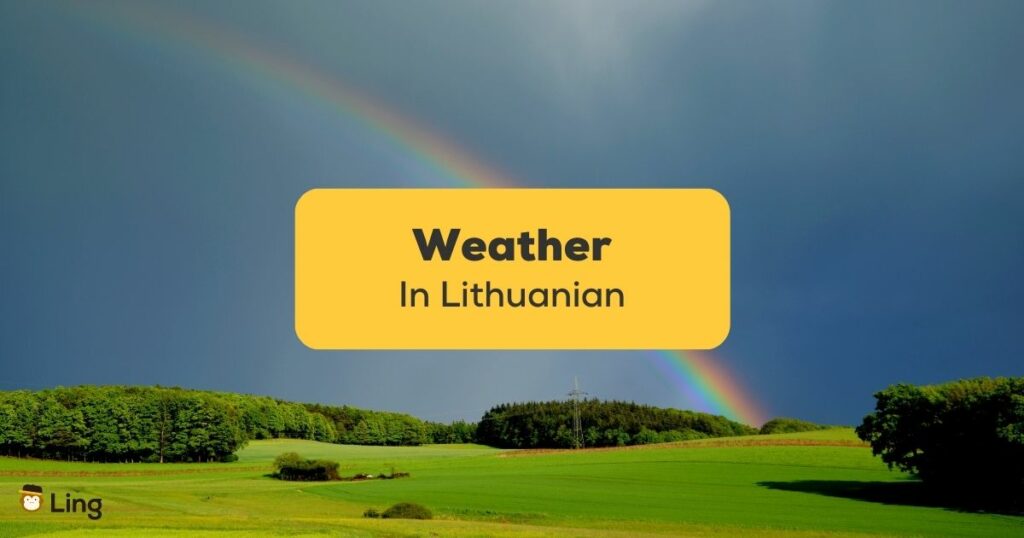Are you planning to visit Lithuania soon? Or maybe you just want to impress your Lithuanian friends by talking about the weather like a pro? Either way, you’re in luck! In this post, we’ll be covering Lithuanian weather vocabulary for all seasons. From freezing winters to warm summers, we’ve got you covered.
Lithuania has 4 distinct metų laikai, or seasons of the year: winter, spring, summer, and autumn. The seasonal temperature changes are drastic, so visiting at the start of spring or autumn could be just as beautiful as summertime. Also, don’t forget about the stunning Lithuanian Christmas markets in the winter! Every season has something to offer, so grab a cup of acorn coffee (a Lithuanian favorite!) and let’s dive into oras, or weather in Lithuanian!
Want to know the best time of year to visit Lithuania? Check out Lithuanian festivals & traditions pageto gauge the best fit for you!
Winter Weather Vocabulary:
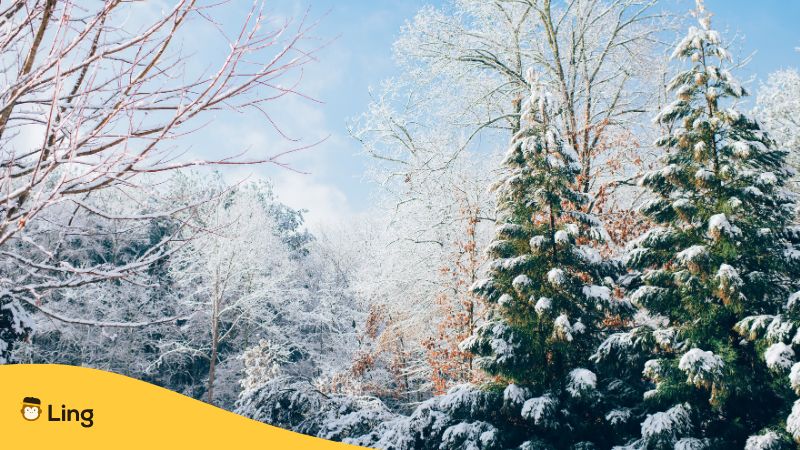
Let’s start with the coldest season of the year – winter. Lithuanian winters can be freezing, with temperatures dropping as low as -20°Celcius (-4° Fahrenheit!) If you’re planning to visit Lithuania during the winter months, make sure you pack lots of warm clothes! Here are some Lithuanian words you might find useful:
- Šaltis (pronounced “shaltis”) – cold
- Sniegas (pronounced “snye-gas”) – snow
- Ledas (pronounced “leh-das”) – ice
- Šlapdriba (pronounced “shlap-dree-ba”) – slush
- Šalčias (pronounced “shalt-chias”) – frost
- Šalčiojimas (pronounced “shalt-chio-yee-mas”) – shivering
Spring Weather Vocabulary:
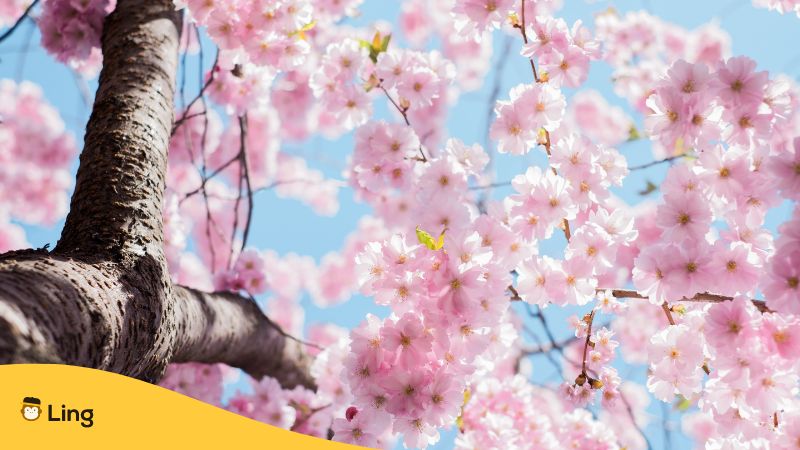
Spring in Lithuania can be quite unpredictable. You might wake up to a sunny day, only to have it start raining a few hours later. This bad weather is enough to drive a person crazy! But don’t worry, we’ve got you covered with some essential Lithuanian spring weather vocabulary:
- Pavasaris (pronounced “pa-va-sa-ris”) – spring
- Liūtis (pronounced “liu-tis”) – rain
- Šiluma (pronounced “shilu-ma”) – warmth
- Vėjas (pronounced “vei-yas”) – wind
- Saulė (pronounced “sau-leh”) – sun
- Debesis (pronounced “de-beh-sis”) – clouds
Summer Weather Vocabulary:
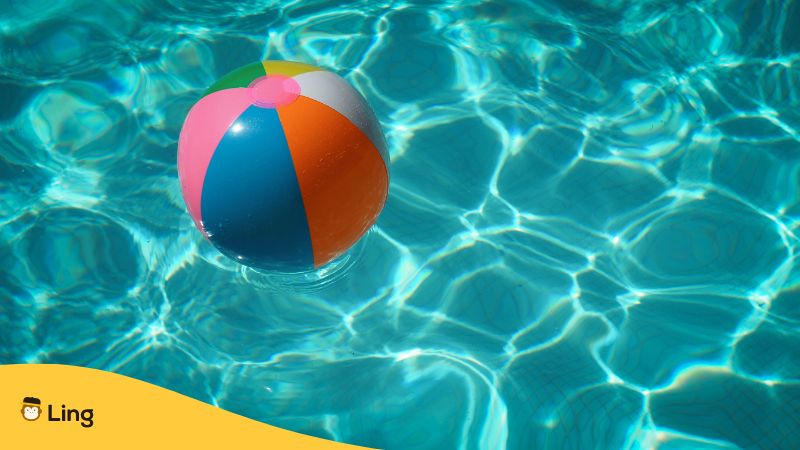
Summer in Lithuania is the perfect time to explore the country’s beautiful nature. With long days and warm temperatures, you can enjoy hiking, swimming, and sunbathing. But Lithuania sure does have some crazy summertime rainstorms! Here are some Lithuanian summer weather words you might need:
- Vasara (pronounced “va-sa-ra”) – summer
- Karšta (pronounced “karsh-ta”) – hot
- Dega (pronounced “deh-ga”) – burning (sun)
- Vakarykštis (pronounced “va-karyk-shtis”) – evening breeze
- Vėsi (pronounced “ve-si”) – cool
- Audra (pronounced “au-dra”) – thunderstorm
Autumn Weather Vocabulary:
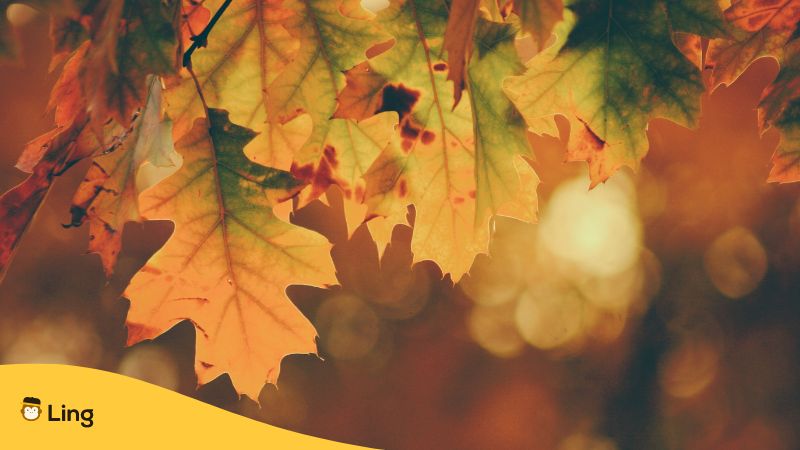
Autumn in Lithuania is a beautiful season, with colorful leaves and comfortable temperatures. However, it can also be quite rainy and windy. Here are some Lithuanian autumn weather words to help you describe the season:
- Ruduo (pronounced “ru-duo”) – autumn
- Vėsus (pronounced “ve-suus”) – chilly
- Rūkas (pronounced “ruu-kas”) – fog
- Vėtra (pronounced “ve-tra”) – storm
- Lietus (pronounced “lie-tus”) – rain
- Raganos žiema (pronounced “ra-ga-nos zhee-ma”) – Indian summer
How To Use Lithuanian Weather Vocabulary In Conversation

Now that you’ve got some basic weather vocabulary mastered, let’s learn how to apply this information to real-life scenarios. Weather is a common topic to talk about with people you just met, so test these phrases out the next time you’re chatting to a Lithuanian local.
- Ačiū Dievui, kad šiandien nesninga! (Thank God it’s not snowing today!)
- Man labai patinka vasaros karštis. (I really like the heat of the summer.)
- Ar jūsų kieme šiandien šviesa saulė? (Is the sun shining in your yard today?)
- Šiandien bus lietus, geriau pasiimkite skėtį. (It’s going to rain today, better bring an umbrella.)
- Ruduo yra mano mėgstamiausias sezonas dėl nuostabios spalvų gausos. (Autumn is my favorite season because of the amazing variety of colors.)
Dialogue Of A Conversation About Weather

Let’s read this dialogue about Laura and Jonas discussing their plans for a beautiful summer day in Lithuanian. Notice how they choose to incorporate weather vocabulary into their speech!
Laura: Laba diena, koks gražus oras šiandien, ar ne?
(Hello, what a beautiful weather today, isn’t it?)
Jonas: Taip, tikrai puiku. Ar planuoji išeiti į lauką šiandien?
(Yes, really great. Are you planning to go outside today?)
Laura: Taip, planuoju pasivaikščioti po parką, ypač kai tokia saulė. O koks tavo planas?
(Yes, I plan to take a walk in the park, especially with such sun. What about your plan?)
Jonas: Man reikia padirbėti, bet baiminuosi, kad pradės lietus. Matėsi debesys vakar, gal jie prikels lietų.
(I need to work, but I’m afraid it might start raining. There were clouds yesterday, maybe they’ll bring rain.)
Laura: Gerai, tu turėtum pasiimti skėtį, kad nebūtum sugautas. Bet aš tikrai tikiuosi, kad lietus palauks bent jau vakarui.
(Okay, you should bring an umbrella, so you won’t get caught. But I really hope that the rain will wait at least until the evening.)
Jonas: Ačiū už patarimą, tikrai pasiimsiu skėtį. Tikiuosi, kad tikrai palauks.
(Thank you for the advice, I will definitely bring an umbrella. I hope it will really wait.)
Not sure if Lithuania is safe for solo travelers? Check out details in this guide to ease your fears and make your Lithuanian vacation an epic one!
Funny Lithuanian Phrases About Weather

To end on a silly note, if you really want to impress a Lithuanian friend or native speaker, try out these funny weather idioms with their English translation.
- Lyja kaip iš kibiro. – It’s raining like from a bucket.
This funny idiom is used to describe heavy rain. Can you think of what English idiom matches it? It’s similar to ‘It’s raining buckets out there!’
- Karšta kaip sūriuose. – It’s hot like in the cheese.
This phrase is used to describe extreme heat. The closest English idiom I can compare this to is ‘It’s like an oven out there!’
- Čia ne pasaka, kad saulė šviečia. – This is not a fairy tale where the sun shines.
This idiom is used to describe a cloudy or gloomy day. A similar one in English is ‘under the weather’ to describe feeling gloomy or sad.
- Vakarykštis vėjas plieskė kaip makaronai. – The evening breeze was slapping like noodles.
This silly idiom is used to describe a strong and gusty wind. A similar one in English is ‘A storm in a teacup.’
- Žiūrėk, kaip griauna dangų! (Look how it’s demolishing the sky!)
This is used to describe a severe storm or thunderstorm. An English counterpart could be ‘A storm is brewing.’
Learn Lithuanian With Ling
In conclusion, learning Lithuanian weather vocabulary is an important part of mastering any language, and Lithuanian is no exception. With its varied climate and colorful idioms, Lithuanian weather vocabulary can be a fun and interesting way to improve your language skills.
Whether you’re enjoying the summer sun, bracing yourself against a winter storm, or just chatting with locals about the weather, knowing these words, expressions and phrases can help you connect with Lithuanian culture and people. So why not start exploring Lithuanian weather vocabulary today? With a little practice and perseverance, you’ll be speaking like a pro in no time!
Want to search for more quality resources and lessons to help you learn Lithuanian? Download the language-learning Ling App today from the App Store and Play Store. It is a highly researched app meant for a fun and personalized language-learning experience. Aside from Lithuanian, there are over 60+ foreign languages to learn on Ling. Download it today!
